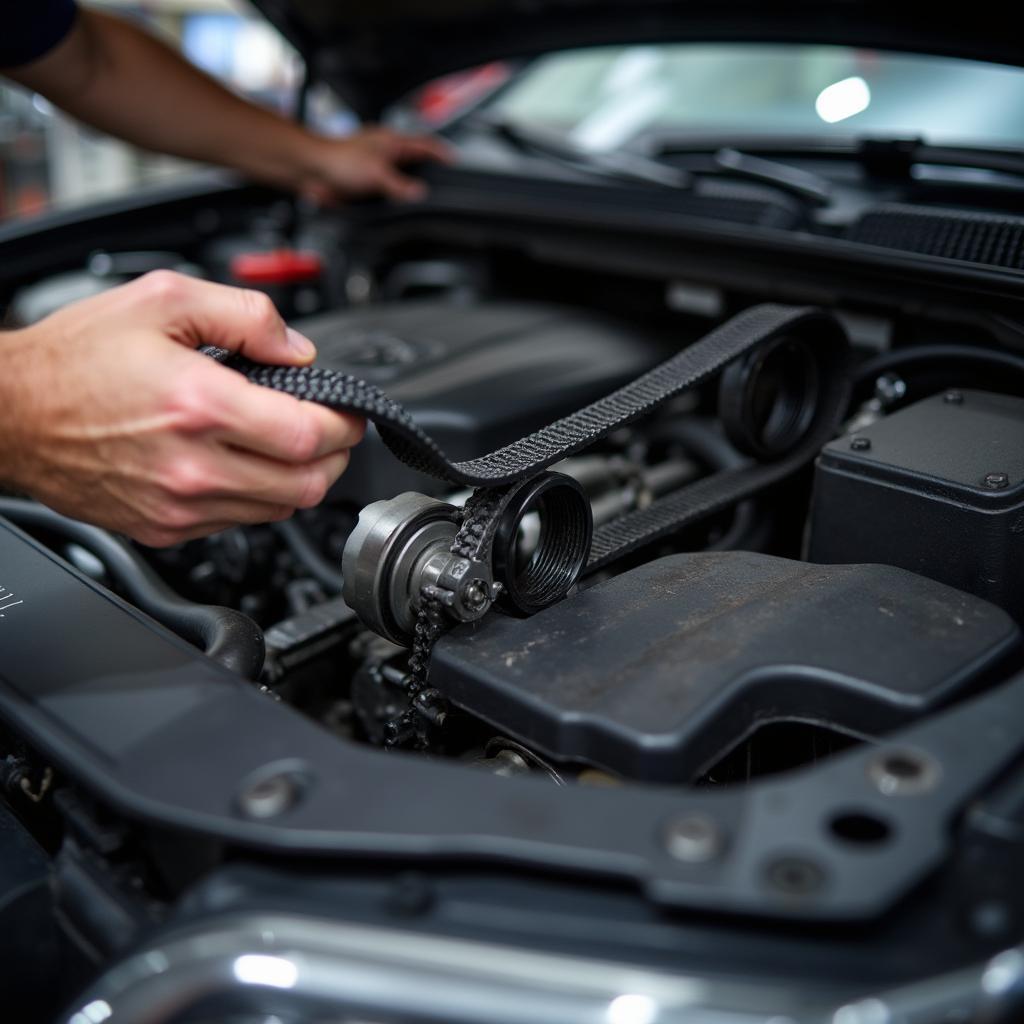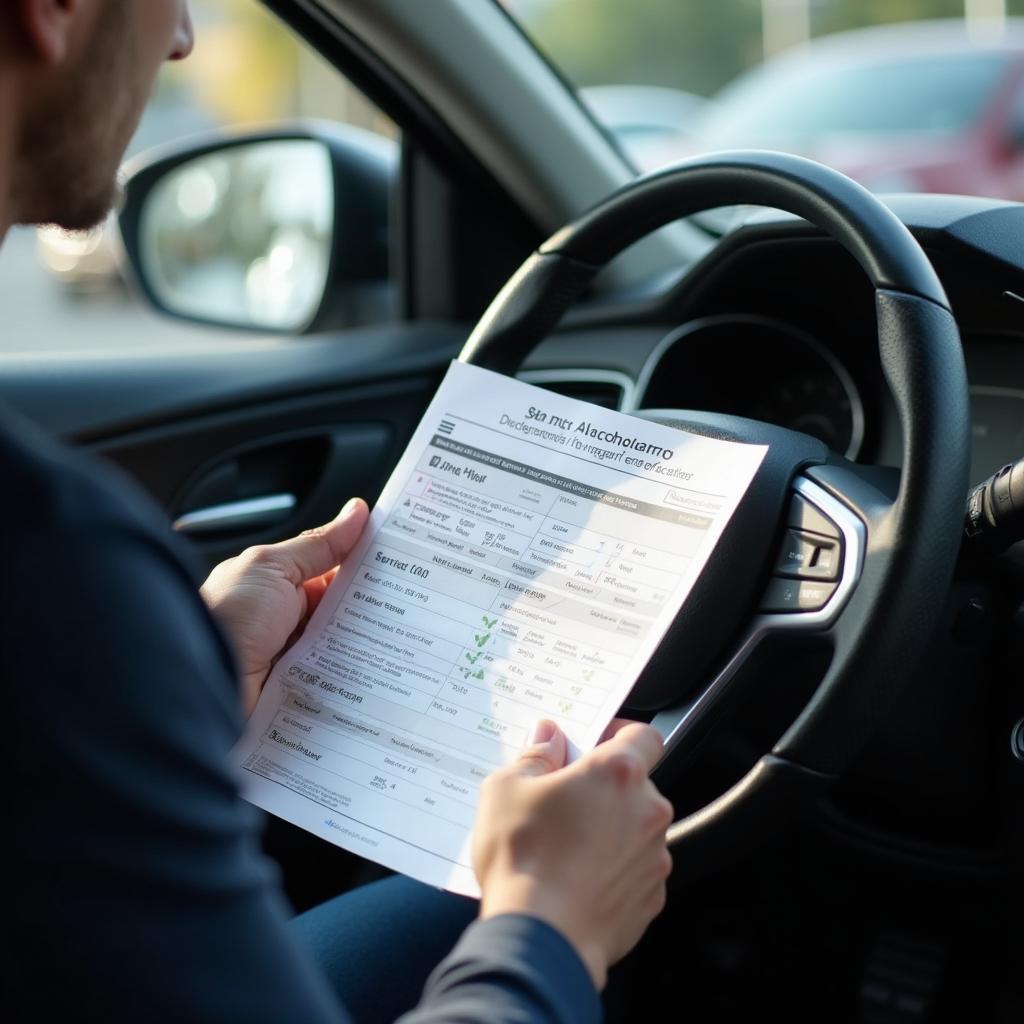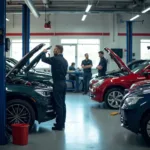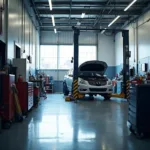Ensuring your car receives regular maintenance is key to its longevity and your safety on the road. An Auto Service Checklist acts as your roadmap, guiding you through essential checks and maintenance tasks to keep your vehicle in peak condition.
Why You Need an Auto Service Checklist
A well-maintained car offers numerous benefits, including improved fuel efficiency, reduced risk of breakdowns, and a higher resale value. An auto service checklist helps you:
- Stay Organized: Track service dates and mileage intervals for different maintenance tasks.
- Prevent Costly Repairs: Identifying minor issues early can prevent major (and expensive) problems down the line.
- Increase Safety: Regular checks of brakes, tires, and lights ensure your car is safe to drive.
- Extend Vehicle Lifespan: Consistent maintenance helps your car perform better for longer.
Essential Items for Your Auto Service Checklist
This comprehensive checklist covers essential maintenance tasks:
Routine Checks (Every 1-3 Months)
- Engine Oil Level and Condition: Check the dipstick and top up if necessary. Look for any discoloration or gritty texture indicating potential problems.
- Coolant Level: Ensure the coolant reservoir is filled between the “Min” and “Max” lines.
- Brake Fluid Level: Check the fluid level in the master cylinder reservoir.
- Windshield Washer Fluid: Refill as needed, especially during winter months.
- Tire Pressure: Use a tire pressure gauge to ensure all tires are inflated to the recommended PSI found in your owner’s manual.
- Tire Tread Depth: Check for wear and tear using a tread depth gauge or the penny test.
- Lights: Inspect headlights, taillights, brake lights, and turn signals for functionality.
- Belts and Hoses: Visually inspect belts and hoses for cracks, fraying, or leaks.
Scheduled Maintenance (Based on Mileage or Time)
- Oil Change and Filter Replacement: Consult your owner’s manual for recommended intervals.
- Air Filter Replacement: A dirty air filter restricts airflow to the engine, impacting performance and fuel efficiency.
- Cabin Air Filter Replacement: This filter cleans the air entering your vehicle’s cabin, improving air quality.
- Spark Plug Replacement: Worn spark plugs can lead to misfires, reduced fuel economy, and engine damage.
- Brake Pad/Shoe Inspection and Replacement: Worn brake pads compromise stopping distance and safety.
- Brake Fluid Flush: Over time, brake fluid absorbs moisture, reducing its effectiveness.
- Coolant Flush: Flushing the cooling system removes contaminants and prevents corrosion.
- Transmission Fluid Flush: Consult your owner’s manual for recommended intervals.
- Timing Belt/Chain Inspection and Replacement: A broken timing belt/chain can cause catastrophic engine damage.
 Timing Belt Inspection
Timing Belt Inspection
Seasonal Checks
- Battery Check (Especially in Winter): Cold weather can weaken batteries.
- Cooling System Check (Before Summer): Ensure the cooling system can handle the heat.
- Wiper Blades: Replace worn wiper blades for optimal visibility during rainy or snowy conditions.
Don’t Forget These Important Reminders!
- Keep Records: Maintaining a record of all service dates, mileage, and repairs helps you track your vehicle’s maintenance history.
- Read Your Owner’s Manual: Your owner’s manual provides specific maintenance schedules and recommendations for your vehicle model.
- Consult a Trusted Mechanic: If you’re unsure about any aspect of your car’s maintenance, don’t hesitate to consult a qualified mechanic.
 Car Maintenance Records
Car Maintenance Records
Frequently Asked Questions
How often should I get an oil change?
This varies depending on your car model and driving habits. Refer to your owner’s manual for specific recommendations. However, a general guideline is every 3,000 miles or 3 months for conventional oil, and every 5,000-7,500 miles or 6 months for synthetic oil.
What does a car service typically include?
A basic car service usually includes an oil and filter change, tire rotation, fluid top-offs, and a visual inspection of key components.
How do I know if my car needs a tune-up?
Signs your car might need a tune-up include reduced fuel efficiency, rough idling, difficulty starting, and decreased engine performance.
Is it essential to follow the manufacturer’s maintenance schedule?
Yes, adhering to the manufacturer’s recommended maintenance schedule helps ensure your vehicle operates optimally, extends its lifespan, and maintains its warranty coverage.
How can I find a reliable mechanic?
Seek recommendations from friends, family, or online reviews. Look for certified mechanics and transparent pricing.
Keep Your Car Happy and Healthy
A well-maintained car is a safer and more reliable car. By following a comprehensive auto service checklist, you can ensure your vehicle stays in top condition for years to come.
Need help finding the right auto service for your needs?
Explore our directory of trusted auto city services for convenient and reliable maintenance and repair.
For specific auto service needs in Alpharetta, GA, check out our recommended alpharetta service center & auto alpharetta ga.
Looking for affordable auto services? We recommend checking out aek a nee affordable auto service.
Don’t forget to download our free auto service checklist forms to easily keep track of your vehicle’s maintenance needs!
If you need car repair services in Bristol, RI, you can find reliable options on our website. We have a comprehensive list of trusted mechanics in the area to choose from. Visit our page on auto repair services bristol ri to learn more.
Remember: Regular maintenance is the key to a happy and healthy car!


